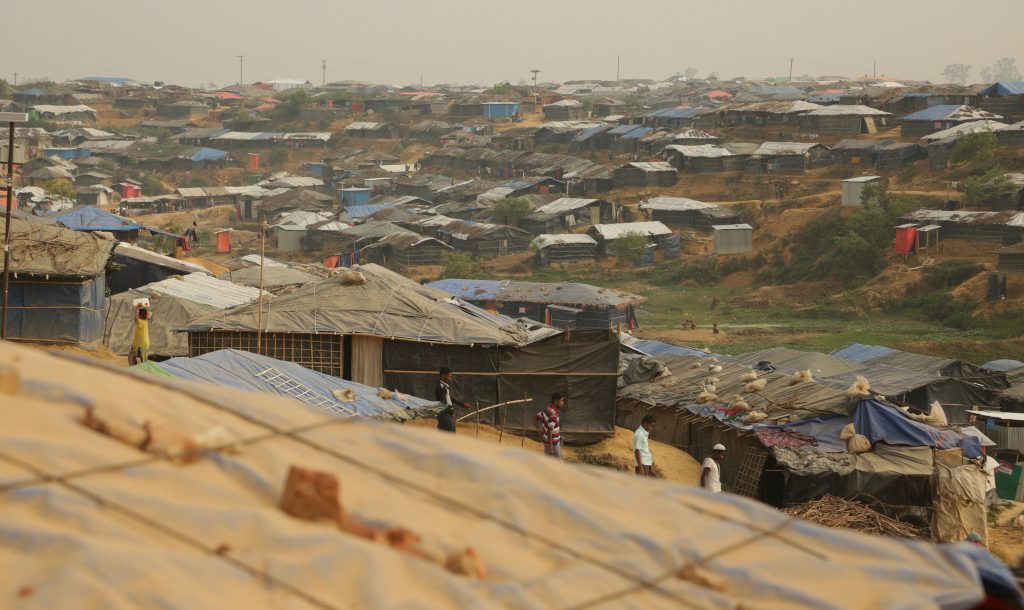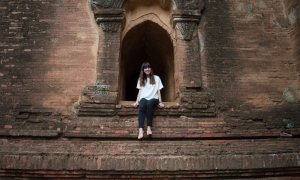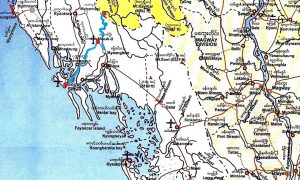In August 2017, the Arakan Rohingya Salvation Army attacked police posts and an army base in western Rakhine state, Myanmar, claiming to fight for the rights of Rohingya, an ethnic Muslim minority living in western Myanmar. Within a few weeks, under the pretext of “clearance operations”, more than 600,000 Rohingya people fled across the border into neighbouring Bangladesh amidst reports of extrajudicial killings, sexual violence and arson by Myanmar’s state military, the Tatmadaw. The United Nations has declared this to be “a textbook example of ethnic cleansing”. This categorisation is only strengthened in private conversations with humanitarian actors working in Bangladesh, who describe the sheer scale of war crimes that have been committed against civilian populations since August.
And yet the Tatmadaw’s campaign has been disturbingly popular within Myanmar. Many of my friends from fieldwork, including members of other long-oppressed ethnic minorities, have posted in support of what they consider to be a mission to rid the country of illegal immigrants and terrorists. In the midst of the horror, I have been left wondering what my role as a researcher is. Indeed, while the anthropologist in my head cautions me to maintain reflexivity and consider the events more critically, this perspective and my pedagogical training seem inadequate right now.
An ethical intellectual
The outcome and stance of the scholarly community who work on Myanmar has been divided. Some have been rancorous and moralising on social media and in the academic blogosphere against those who have not taken a stronger position. Often, in moments of crisis like the one we have watched unfold in northern Rakhine state, we are moved to action: to organise, to respond, to speak out. Undoubtedly, the nature of the current crisis demands a concerted and collective response. Many of us have, however, been publicly silent, reflecting in private conversations on the complexities of the situation—careful that in the race to say something thoughtful that we don’t reproduce misconceptions and further falsehoods.
For me, part of this silence was guided by my relationships with people from my fieldwork and ethical considerations related to representation, voice, and politics. As an anthropologist, I also saw it as important to draw out the paradoxes of the crisis and to take seriously the lived social practices which substantiate such atrocities. Indeed, unlike some other disciplines, anthropologists are not tasked with necessarily identifying solutions but with unearthing complexity. We demand time and space for deep reflection. It has become increasingly apparent, however, that the Myanmar military was quite literally cleansing northern Rakhine state of Rohingya people in what some have termed the “final solution”. Complexity and nuance may not be the right answer to the horrific questions thrown up by the latest crisis.
Indeed, many of us simply have no sense of how to respond to the horror. It’s beyond belief. It’s beyond words. Colleagues of mine got together to discuss the implications of such a crisis on our research and institutional ties in the wake of the crisis. But beyond acknowledging that past periods have also seen other disturbing events in Myanmar, our discussion largely reflected an inability to comprehend what was taking place in the country we all love.
What can we do? What should we do? Is there anything we can do? These are the same questions, but they resonate in different ways for different people. For a young scholar like myself, who has been working on the country for a shorter period than others, this whole situation has felt like a rupture to the very core of my understanding of a country that I have struggled so hard to know and understand.
While I am heartbroken at the systematic destruction of the Rohingya people, my personal relationships with people from Myanmar have made public stances complicated. I have found it especially difficult to reconcile my experience of Burmese people as unbelievably kind and generous with the vociferous defence many have voiced of the military’s violence against the Rohingya.
Having worked in Karen state, an ethnic minority region, I have found it even more horrifying to see people justify the same tactics that the military has used against their very people for generations. Even though I can grasp analytical answers, they seem to be swallowed up by questions grounded in my own experiences: why don’t the experiences of the Rohingya resonate with Karen people and other minorities who, for generations, have also experienced atrocities at the hands of the Myanmar military? Beyond some brave Karen elites, why do so few of my friends share any sympathy for the plight of those who have been forced to flee amidst terror, burning villages, rape and murder, like they and their own families have experienced?
“Fake news”
Part of this can be explained by the sheer level of misinformation about the current crisis, but also about the Rohingya more broadly in Myanmar. Indeed, views of the situation of the Myanmar populace have been aided by the fact that many now have access to Facebook and a deluge of misinformation and “fake news” – even though many still lack reliable electricity, employment or healthcare. While those outside the country might be focused on the sheer scale of human rights abuses and the humanitarian tragedy unfolding in Bangladesh’s refugee camps, the image of the crisis circulating amongst people in the country couldn’t be more different.
The local focus has instead been on the threat of “terrorism” committed by Rohingya people and the Arakan Rohingya Salvation Army (ARSA) against the political community of “Myanmar”, defined for many around their sense of a Buddhist nation under threat. This has been fuelled by Facebook and reports from local media, which have emphasised alleged atrocities committed by ARSA against Buddhist and Hindu communities. It’s no surprise that this narrative has been propagated by military authorities seeking to legitimise their campaign. But monks, teachers, academics and political leaders including Aung San Suu Kyi have also played a key role in disseminating misinformation.
As a result of the crisis, some within the scholarly community are debating the question of boycotting Myanmar and academic research collaborations. There has been much digital ink spilt in both public forums and private threads on this topic, with few supporting the proposition of an outright boycott. Having spent the last three years working with the University of Yangon to develop a strong partnership across various disciplines, I agree with spokespeople who have highlighted the profound importance of continued scholarly engagement.
Despite a critical anthropological hue on educational developmental models, I fundamentally believe in the power of education and knowledge, particularly in its ability to challenge the logics and mental models that make discrimination and mass violence plausible solutions to social ills. But the question still remains. What is our role?
The limits of reflexivity
For me, the crisis has led me to probe the purpose and relevance of my own research. Questions of how to be an engaged researcher whilst also maintaining a level of academic integrity have started to pervade my recent writing. Lost in the jargon of anthropological reflexivity, how can we still maintain a moral stance as researchers in a context such as this?
Debates within anthropology and concerns raised about our role as a “moral discipline” have shaped research for the last two decades since the postmodern, postcolonial turn. These discussions have also been propelled by advances in applied anthropology and feminist research, and since 1995, when Nancy Scheper-Hughes argued for a “militant” anthropology—“a responsive, reflexive, and morally committed being, one who will ‘take sides’ and make judgements”.
This call resulted in a corpus of studies that has been defined by Sherry Ortner as “Dark Anthropology’, “research that focuses on violence, suffering, trauma, humanitarianism and human rights. This has seen anthropologists take a more engaged and activist position including through calls to make a contribution to society under the mantle of “public anthropology” (see more at the Centre for a Public Anthropology). Didier Fassin has suggested that all anthropological research is inherently moral and value laden, but that as anthropologists we have a commitment to respect the critical epistemological grounds of our discipline. Yet following on from these conversations, in a recent article in HAU: The Journal of Ethnographic Theory, Ciara Kierans and Kirsten Bell demand a more “critical” anthropology, contending that anthropology’s turn towards political advocacy is misplaced and that ultimately “an analytic of ambivalence” should instead be cultivated.
A strong part of me agrees with this latter view, that the strength of our discipline lies in the ability to step back and see the overall picture, to understand and explicate rather than to evaluate. Indeed, this view has helped me to better understand the myriad ambiguities and contradictions of Karen frameworks of morality and ethics in my own research. While an analytic of “ambivalence” might, as Kierans and Bell note, “be our best strategy for understanding what is going on” in Myanmar, I wonder if it is the appropriate moral stance.
Another part of me feels that in this particular instance in Myanmar, ambivalence is profoundly problematic. How can one be ambivalent when it is clear that war crimes and ethnic cleansing has taken place? But what role do we as anthropologists have in addressing contemporary social problems of this scale? Is it hubristic to think we even have a role?
A fellow researcher who works on Myanmar recently commented privately that our role as scholars is to “play the long game—to document, criticise, interpret.” Regardless of how we approach the crisis in Myanmar, given the sheer level of misinformation circulating there and around the world, the need for scholarship which deconstructs and challenges existing frameworks through education and research has never been more critical. And yet, these reflections leave more questions than answers. In a context such as is occurring in Myanmar, is it enough to seek to understand, critique, and offer multivalent insights? Or, as Roy D’Andrade notes, do the “empirically demonstrable truths” of such suffering and injustice demand we take further action?
• • • • • • • • • • • •
 Facebook
Facebook  Twitter
Twitter  Soundcloud
Soundcloud  Youtube
Youtube  Rss
Rss 


